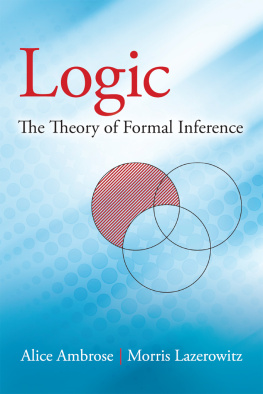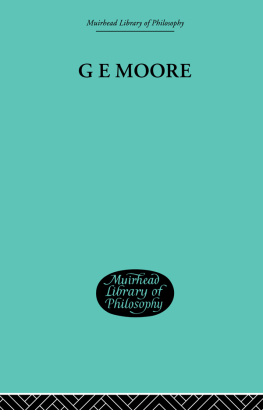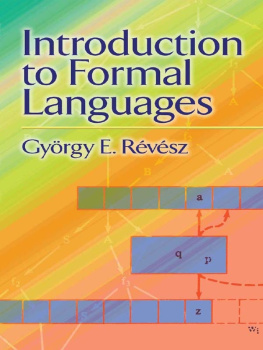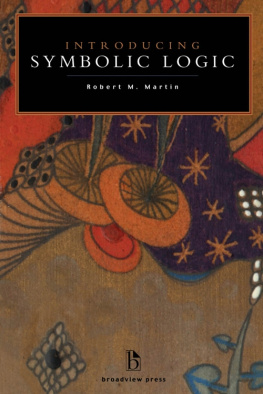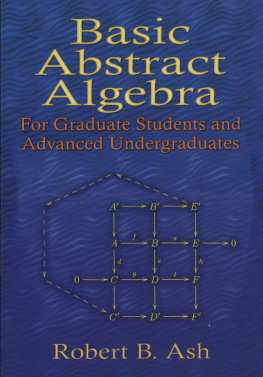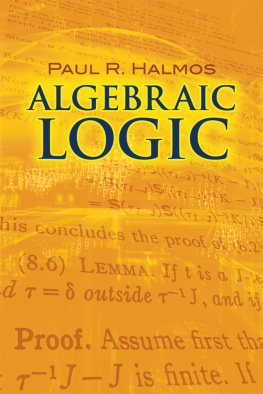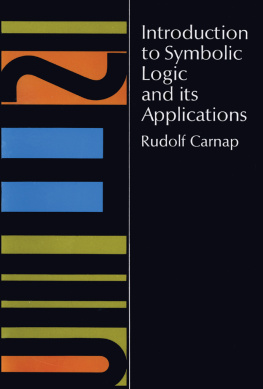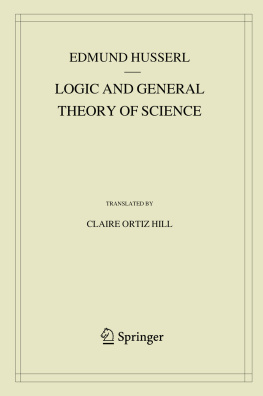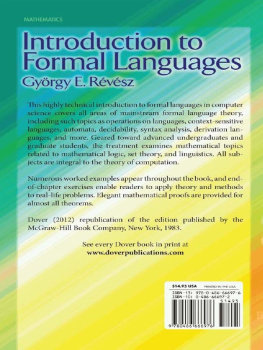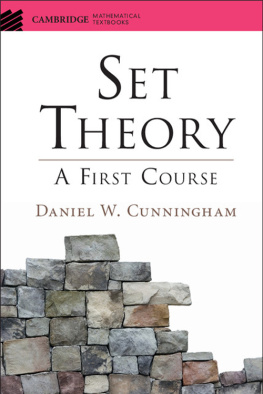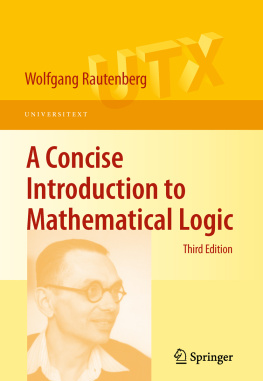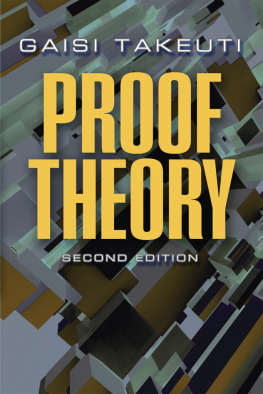Logic
The Theory of Formal Inference
Alice Ambrose | Morris Lazerowitz
DOVER PUBLICATIONS, INC.
Mineola, New York
Copyright
Copyright 1961, 1989 by Alice Ambrose and Morris Lazerowitz All rights reserved.
Bibliographical Note
This Dover edition, first published in 2015, is an unabridged republication of the work originally published by Holt, Rinehart and Winston, New York, in 1961. This edition is published by special arrangement with Cengage Learning, Inc., Belmont, California.
Library of Congress Cataloging-in-Publication Data
Ambrose, Alice, 1906
Logic : the theory of formal inference / Alice Ambrose and Morris Lazerowitz.
pages cm
Originally published: New York : Holt, Rinehart and Winston, 1961.
eISBN-13: 978-0-486-80859-8
1. Logic. I. Lazerowitz, Morris, 19091987. II. Title.
BC108.A55 2015
160dc23
2015020217
Manufactured in the United States by RR Donnelley
79677901 2015
www.doverpublications.com
Contents
Logic
The Theory of Formal Inference
[ I ]
Truth-functions
Introduction
The term logic, understood as designating the general theory of exact reasoning, has traditionally been used as a covering term for quite different subject matters: inductive, or probable, inference, and a special kind of deductive inference. Aristotle (385-322 B.C.), the great Greek philosopher, was the first to investigate inferences of the latter kind, inferences in which, to employ his description, certain things being stated, something other than what is stated follows of necessity from their being so. The theory Aristotle developed extended to, but not beyond, the requirements of immediate inference and the syllogism, i.e., it covered deductive inferences made from single statements and inferences drawn from pairs of statements of certain kinds. This initial flowering of logic was followed by a dormancy of some two thousand years; and when, about a hundred years ago, logic again sprang to life, it developed enormously in the direction of generality and system, with the result that syllogistic doctrine came to occupy only a minor place in it. In its latest developments logic was seen to be linked to mathematics, and even thought to be the foundation on which the system of mathematics rests. Thus the science which first began with what Aristotle called Analytics (some hundreds of years later given the designation logic by Alexander of Aphrodisias) has now undergone a development which ranks it as a mathematical discipline.
In this introduction to logic we shall confine ourselves to what is called formal logic, as distinct from that branch of the subject which investigates probable inference. And we shall begin, quite unhistorically, with the most general part of logic and move on to more specific parts, within which the syllogism finds a much humbler place than with the ancients. We turn immediately to a description of the kind of deductive inferences that formal logic investigates. Aristotles description of deductive inferences, intended only to cover that restricted class which he investigated, is even too wide for the whole class of inferences with which logic deals. Inferences in which, according to Aristotle, something follows of necessity, constitute all possible deductive inferences, whereas the deductive inferences which are the subject matter of formal logic are only a subclass of these. To illustrate the distinction between non-formal and formal deductive inferences, consider, as an instance of the former, the deduction of a has 12 edges from a is a cube. Given that a is a cube it follows of necessity that a has 12 edges. To assent to the given necessitates admission of the consequence; one cannot consistently admit the premise while denying that a has 12 edges. This inference, which is effected by means of the pair of concepts, cube and having 12 edges, stands in sharp contrast to the inference from the premise
to the conclusion | If a is a cube, a has 12 edges |
If a does not have 12 edges, a is not a cube. |
The difference may be made perspicuous by replacing the concepts cube and having 12 edges by pairs of brackets in each inference:
Premise: a is ( ), Conclusion: a is [ ];
Premise: If a is ( ), then a is [ ], Conclusion: If a is not [ ], then a is not ( ).
The first inference is effected solely in virtue of the particular concepts cube and having 12 edges. It would, obviously, not hold for every pair of concepts. For example, given that a is blue we are not entitled to infer that a is square. But the second inference holds for all possible pairs of concepts, regardless even of whether the statements in which they figure are relevant to each other. Thus, from the statement, If it is snowing in Alaska, butter is a medium of exchange in Tibet, we may validly infer the statement, If butter is not a medium of exchange in Tibet, it is not snowing in Alaska. The transition from one statement to the other is effected in virtue of their formal relations to each other. We pause to remark the even more striking difference between all these deductive inferences and the inference from Sirens are sounding to There is fire. In this inference the premise does no more than lend a degree of probability to the conclusion and does not necessitate it; the assertion of the premise together with the denial of the conclusion is a possible truth.
In logic methods are devised for calculating new statements from given statements solely by reference to their forms, or, to put it differently, techniques are invented for testing the validity of formal inferences. To explain this description of logic, it is required to distinguish between the form of a statement and its material content. The notion of form in abstraction from content is intuitively grasped when one sees what is common to If the figure is a cube, then it has 12 edges and If Jones is a Mexican, then he is soft-spoken. Once the subject matter of the two statements is disregarded, what is left is a bare schema exhibiting how the constituent statements are related. Provisionally we may say that the form of a Statement is what remains when the constituents have been replaced by-variables, the same constituents by the same variables and different constituents by different variables. The role of blanks enclosed by pairs of brackets in the expressions above is that of variables. The resultant expressions are said to consist solely of formal terms, the variables themselves counting as formal terms.
Formal Terms
The units figuring in inferences are statements, which are characterized by the property of being either true or false, or of having a truth-value. By virtue of the formal terms occurring in statements, logic provides a means of calculating the truth-value of a statement from that of the given statement. The expression formal term is defined here ostensively, that is, by giving a list of terms to which it applies. We introduce as our first formal terms variables p, q, r, , whose range of values consists of statements. Next introduced are two formal terms of a different kind: or, for which the symbol is used, and not, for which the symbol ~ is used. These will be classed together as operators and assigned special names: will be called disjunction and ~ will be called negation. The expression

Next page
